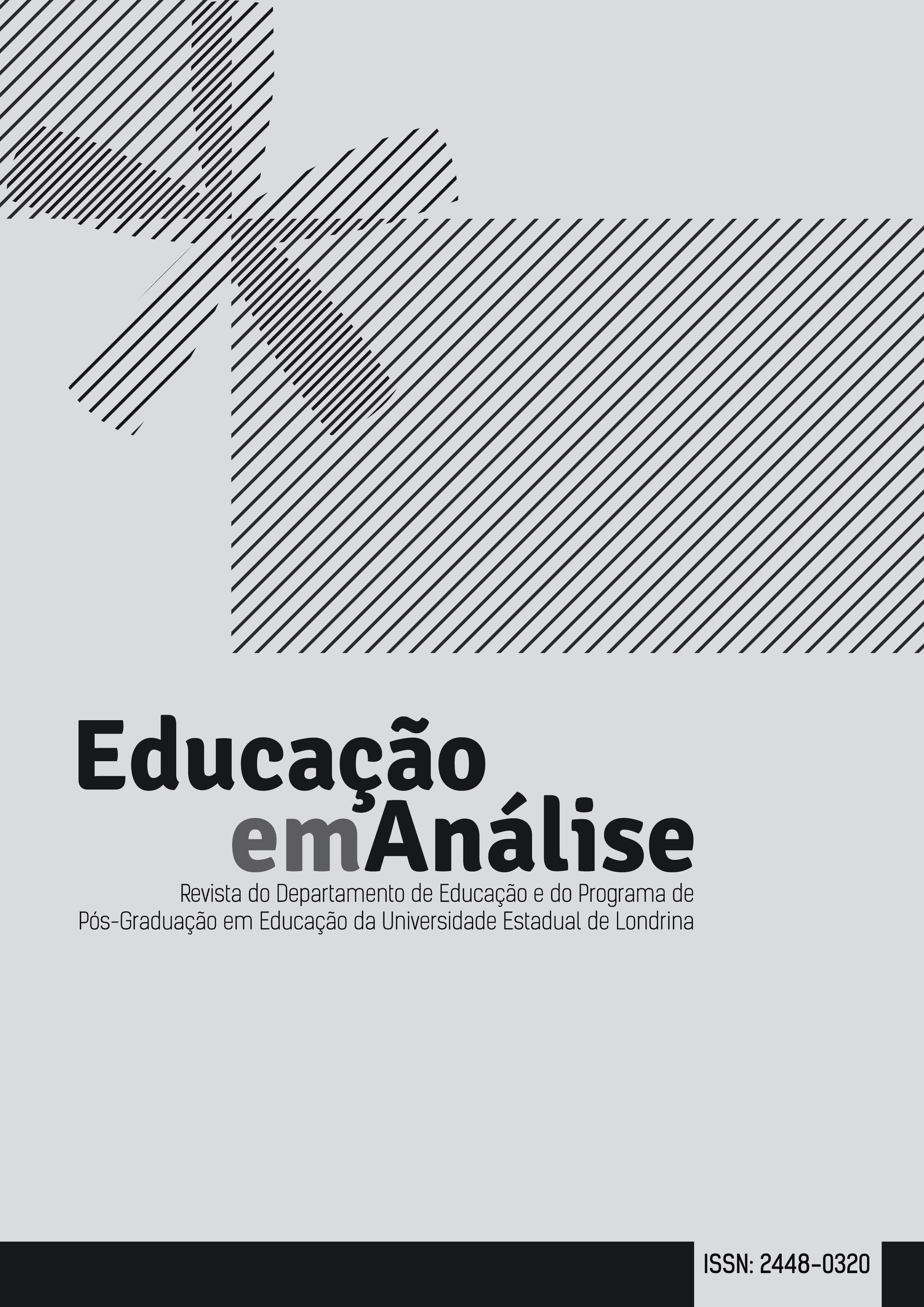Cybercultural children:
contributions to thinking about the school's performance
DOI:
https://doi.org/10.5433/1984-7939.2024v9n3p688Keywords:
Cyberculture; Children; Digital technologies; Basic Education.Abstract
Technological advances have been changing the way we live, be and be in the world, influencing behaviors already in childhood. At school, these changes are also felt in the ways of learning and teaching, making it essential to prepare teachers for pedagogical activities that involve digital technologies for children to act in the context of cyberculture. The present study is an excerpt from a master's research in Education, and aims to understand the profile of children in the context of cyberculture. We carried out the construction of data with/with the research subjects, students of the 3rd year of the initial years of elementary School of a public school in the city of Mossoró/RN. We were inspired by the theoretical, epistemological and methodological research and training of a multi-referential background. We found that children are cybercultural subjects and interact daily with technologies, with emphasis on games and social networks, and that continuing education, reflection and intersubjective and plural dialogue between school/family/society is a condition for the search for a citizenship and authorial formation, in the future, of children in the context of cyberculture.
Downloads
References
BENTES, Jackson; FREIRE, Wendel; PIANTKOSKI, Marcelo; AZAMBUJA, Michelle. Infância e cultura digital: diálogo com gerações. Curitiba: Appris, 2017.
EISENSTEIN, Evelyn; SILVA, Eduardo Jorge Custódio. Crianças, adolescentes e o uso intensivo das tecnologias de informação e comunicação: desafios para a saúde. In: NÚCLEO DE INFORMAÇÃO E COORDENAÇÃO DO PONTO BR (coord.). Pesquisa sobre o uso da Internet por crianças e adolescentes no Brasil: tic kids online Brasil 2015. São Paulo: CETIC.br, 2016. p. 117- 128.
FERREIRO, Emilia. Reflexões sobre alfabetização. Tradução Horácio Gonzales, Maria Amélia de Azevedo Goldberg, Maria Antônia Cruz Costa Magalhães, Mansa do Nascimento Paro e Sara Cunha Lima. 24. ed. São Paulo: Cortez, 2001.
INTELIGÊNCIAS em rede na educação superior. Uberlândia: UFU, 2023. 1 vídeo (120 min). Publicado pelo canal Canal da UFU. Disponivel em: https://www.youtube.com/watch?v=QaFMuZg6S7A. Acessado em: 5 jan. 2024.
LÉVY, Pierre. Cibercultura. São Paulo: Editora 34, 1999.
MACEDO, Roberto Sidnei. Etnopesquisa crítica, etnopesquisa-formação. 2. ed. Brasília, DF: Liber Livro Editora, 2010.
MACEDO, Roberto Sidnei; GALEFFI, Dante; PIMENTEL, Álamo. Um rigor outro sobre a questão da qualidade na pesquisa qualitativa educação e ciências antropossociais: educação e ciências antropossociais. Salvador: UFBA, 2009. Disponível em: https://repositorio.ufba.br/ri/bitstream/ufba/206/1/Um%20rigor%20outro.pdf. Acesso em: 10 jan. 2024.
OLIVEIRA, Marcos Antonio; PONTES, Verônica Maria de Araújo. O letramento digital e o ensino remoto: a percepção dos estudantes sobre a aprendizagem. Revista Práticas Educativas, Memórias e Oralidades, Fortaleza, v. 4, p. 1-14, 2022. DOI: https://doi.org/10.47149/pemo.v.4.7212
PADILHA, Adriano. Emoji. In: ENCICLOPÉDIA Significado. [S. l.]: 7Graus, [2023]. Disponível em: https://www.significados.com.br/emoji/. Acesso em: 10 jan. 2024.
RIBEIRO, Mayra Rodrigues Fernandes. A sala de aula no contexto da cibercultura: formação docente e discente em atos de currículo. 2015. 209 f. Tese (Doutorado em Educação) - Universidade do Estado do Rio de Janeiro, Rio de Janeiro, 2015.
ROJO, Roxane. Letramentos múltiplos, escola e inclusão social. São Paulo: Parábola Editorial, 2009.
ROJO, Roxane. Pedagogia dos multiletramentos: diversidade cultural e linguagens na escola. In: ROJO, Roxane; MOURA, Eduardo (org.). Multiletramentos na escola. São Paulo: Parábola Editorial, 2012. p. 11-31.
SANTOS, Edméa. Pesquisa-formação na cibercultura. Teresina: EDUFPI, 2019.
SANTOS, Rosemary. Formação de formadores e educação superior na cibercultura: itinerâncias de grupos de pesquisa no facebook. 2015. 183 f. Tese (Doutorado em Educação) – Faculdade de Educação, Universidade do Estado do Rio de Janeiro, Rio de Janeiro, 2015.
SBP – SOCIEDADE BRASILEIRA DE PEDIATRIA. Tempo máximo de uso de telas para crianças e adolescentes será um dos temas tratados em evento da SBP a ser realizado em Belo Horizonte. Sociedade Brasileira de Pediatria, Rio de Janeiro, 15 out. 2018. Disponível em: https://www.sbp.com.br/imprensa/detalhe/nid/tempo-maximo-de-uso-de-telas-para-criancas-e-adolescentes-sera-um-dos-temas-tratados-em-evento-da-sbp-a-ser-realizado-em-belo-horizonte/. Acesso em: 12 jul. 2023.
SERRES, Michel. Polegarzinha. Tradução Jorge Bastos. Rio de Janeiro: Bertrand Brasil, 2013.
SILVA, Marco. Sala de aula interativa a educação presencial e à distância em sintonia com a era digital e com a cidadania. In: CONGRESSO BRASILEIRO DA COMUNICAÇÃO, 24., 2001, Campo Grande. Anais […]. Campo Grande: INTERCOM, 2001.
SOARES, Magda. Alfaletrar: toda criança pode aprender a ler e a escrever. São Paulo: Contexto, 2020.
Downloads
Published
How to Cite
Issue
Section
License
Copyright (c) 2024 Dayse Medeiros de Sousa Figueirôa, Mayra Ribeiro

This work is licensed under a Creative Commons Attribution-NonCommercial 4.0 International License.
The journal reserves the right to make normative, orthographic and grammatical changes in the originals, with the aim of maintaining the cultured standard of the language and the credibility of the vehicle. It will, however, respect the authors' writing style. Alterations, corrections, or suggestions of a conceptual nature will be sent to the authors when necessary. In these cases, the articles, after being adequate, should be submitted to a new appreciation.









